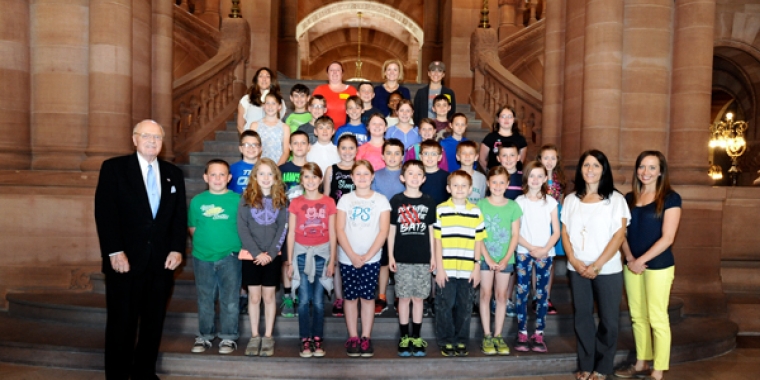
Senator Farley Unveils "Grown in New York" to Strengthen Agriculture and Family Farms

State Senator Hugh T. Farley (R, C, I - Schenectady) and his fellow Senate Republican colleagues have created a plan, "Grown in New York" that aims to help New York's family farms prosper. The goal is to strengthen the State's $5.2 billion agriculture industry by expanding markets for New York-grown products, improving the bottom lines of family farms, and investing in the future of farming.
The Senate's "Grown in New York" plan would:
Strengthening Family Farms by Reducing Taxes on Farmers
> Two-percent property tax cap for farms; and
> Reduce energy costs on farms by rejecting the Governor's effort to extend the 18-a energy tax, and restoring the 18-a assessment back to its pre-2009 level.
Helping New York Farmers Expand Their Markets, Boost Productivity, Increase Profitability
> Dairy: Support the Governor's review of a State regulation that limits the size of some dairy farms;
> Maple: Support legislation to cut burdensome regulations and expand opportunities for maple producers;
> Farmers Markets: Urge state Department of Agriculture and Markets to commit additional resources to updating its database of New York farm markets, and make information more easily available to the public;
> Food Hubs: Support the Governor's plan to create new "hubs" located in growing regions of the state to facilitate access to New York City markets;
> "Buy from the Backyard:" Support this program that sets a goal of at least 20 percent of food purchases by state and local government agencies to include locally produced items;
> Remove Tariffs: Encourage our federal delegation, as well as Canadian officials to remove a severe tariff that restricts New York wines from being imported into Ontario;
> Farm Breweries: Support increased funding to assist farmers in adding new crops like malt and hops for use in New York' burgeoning small batch and locally produced beer breweries;
> Biofuel Crops: Support tax incentives for farmers to produce and use alternative, crop-based fuels; and
> Rescue Abandoned Farmland: Provide incentives to return forest and abandoned fields to active farm producing.
Keeping Farms in the Family
> Increase Estate Tax Threshold for farms from $1 million to $5 million;
> Create Farm Savings Accounts for young people to purchase farms and to help farmers cover unexpected expenses and losses related to farming; and
> Support continued funding of farming education and enrichment programs such as Future Farmers of America and 4H.
Removing Obstacles to Success and Cutting Red Tape for Farmers
> Cut needless red tape for farmers, who are subject to regulation by more than 20 different federal, state and local agencies. Duplicative red tape prevents farmers from spending more time working in their fields.
Investing in the Future of Farming
> Seek additional budgetary support for: maple promotion, the Farm Viability Institute, dairy profits teams that help farmers improve efficiency, and funds to help berry and apple growers recover from damage from storms and invasive species.
Dine: Pride of New York
> This bill would expand the current "Pride of New York" program by creating the "Dine: Pride of New York" program, allowing restaurants serving food and food products produced in New York State access to promotional materials in order to increase their exposure to consumers and promote the sale of locally grown food.
Protecting Farmers from Tractor Rollovers
> The Senate is proposing to restore funding for the Tractor Rollover Program that provides help to New York farmers to purchase and retrofit tractors with rollover protective structures (ROPS). The program rebates 70 percent of the cost of purchasing and installing the ROPS, up to $765. Tractor accidents are the number one cause of fatalities on the farm.
Support for Dairy Producers
> New York does not set the price of milk that our dairy farmers produce, and the Senators stressed the critical need for the federal government to maintain strong support for key federal programs, such as the Dairy Production Margin Protection Program and Dairy Market Stabilization, to stabilize the milk pricing system and to support a strong dairy industry.



